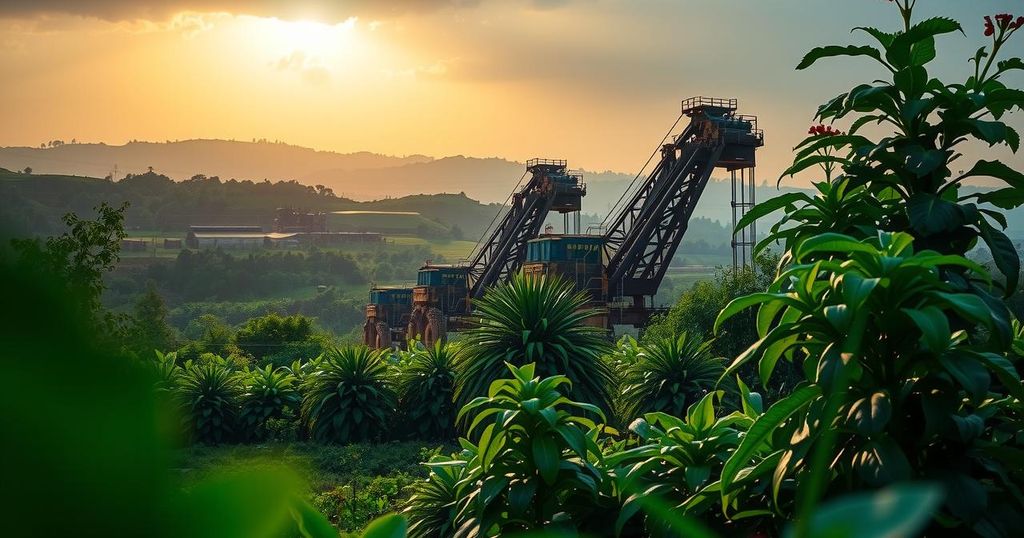Environmental Crisis in Congo: The Impact of Chinese Mining Operations

The Okapi Wildlife Reserve in Congo faces devastating environmental damage from Chinese mining operations. Kimia Mining has bypassed protective laws, resulting in extensive deforestation and pollution. Local communities suffer from economic hardship as their livelihoods are compromised, mirroring broader patterns of exploitation in the DRC. Serious actions must be taken to uphold environmental standards and protect vulnerable ecosystems and populations.
In the Ituri province of the Democratic Republic of Congo, an environmental crisis is rapidly escalating as Chinese mining operations devastate the Okapi Wildlife Reserve. This UNESCO World Heritage site, once a sanctuary for rare species, now faces systematic destruction due to the activities of Kimia Mining Investment. These operations have disregarded international standards and Congolese law, resulting in significant degradation of the landscape along the Ituri River and threatening local wildlife.
The effectiveness of these mining operations was facilitated by a dubious alteration of the reserve’s boundaries. Originally, the area was protected against mining; however, under questionable conditions, the borders were modified to allow for Kimia Mining’s expansion. Despite the company’s claims regarding adherence to official maps, the ICCN insists that the original boundaries should be upheld to protect the reserve’s integrity.
Environmental damage extends beyond deforestation; harmful practices such as the use of mercury in gold extraction have resulted in widespread pollution of water sources and soil. Former Kimia Mining employees reported that abandoned pits pose dangers to wildlife and local communities, significantly reducing agricultural yields for nearby residents. This contamination threatens livelihoods and the region’s biodiversity.
The Okapi Wildlife Reserve, crucial for the survival of approximately 15% of the global okapi population, is under severe threat as mining activities proliferate. Reports indicate a rise in poaching activities due to the diminished population of game animals in the area, transforming the reserve from a sustainable hunting ground into a barren industrial zone.
This situation represents a broader trend of Chinese resource exploitation in the Democratic Republic of Congo, exemplified by the recent arrest of 17 Chinese nationals for illegal mining operations in South Kivu Province. Such unauthorized activities lack proper documentation and environmental protections, further exacerbating the challenges faced by local communities who are losing their traditional livelihoods.
The human implications of these mining activities are deeply concerning. Local populations that once depended on sustainable practices now face poverty due to high costs imposed by Kimia Mining for material extraction. This predicament mirrors China’s wider strategy in the DRC, particularly highlighted by the controversial Sicomines deal, which failed to deliver the promised infrastructure benefits while granting Chinese companies access to lucrative mining rights.
Between January and May, over 480 hectares of forest cover within the reserve were lost, impacting both local biodiversity and the global climate as the Congo Basin rainforest plays a crucial role in carbon sequestration. Despite claims of adhering to environmental standards, Kimia Mining’s actions illustrate a blatant disregard for environmental conservation, as displayed in the remarks of their spokesperson suggesting that economic gains take precedence over environmental values.
The environmental degradation occurring in the Democratic Republic of Congo’s Ituri province reveals the complex interplay of economic interests and environmental protection efforts. The Okapi Wildlife Reserve, recognized for its unique biodiversity, is under siege from mining practices that flout regulations. There is a significant concern regarding the sustainability of local ecosystems and the livelihoods of communities that depend on them, set against a backdrop of international investments driven by resource extraction.
The situation in the Okapi Wildlife Reserve demonstrates the severe consequences of unchecked mining operations facilitated by questionable regulatory practices. This devastation not only jeopardizes unique biodiversity but also threatens the livelihoods of local communities and global environmental health. Without stringent enforcement of protective measures and accountability for foreign enterprises, such crises will likely continue in the region.
Original Source: allafrica.com








